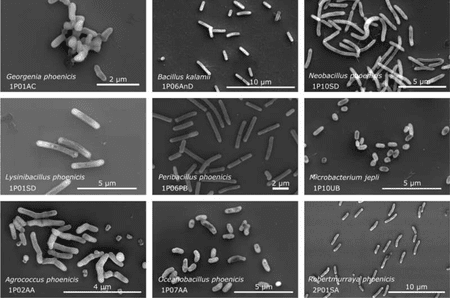
New Delhi, May 13 (IANS) An international team of scientists from India, Saudi Arabia, and the US has identified 26 novel bacterial species growing inside cleanrooms associated with NASA space missions.
The study, published in the journal Microbiome, highlights the importance of rigorous contamination control to prevent unintentional microbial transfer during space missions.
Cleanrooms are highly specialised facilities engineered to maintain exceptionally low levels of dust and microorganisms. Spacecraft are assembled in cleanrooms.
These unknown and newly described species carry genetic traits associated with resilience to extreme environments such as those found in space, and may hold clues to space survival and biotech, said the team.
While the controlled environments have tightly regulated airflow, temperature, and humidity that inhibit microbial survival, some microorganisms — extremophiles — thrive in such environments.
“Our study aimed to understand the risk of extremophiles being transferred in space missions and to identify which microorganisms might survive the harsh conditions of space,” said lead researcher Professor Alexandre Rosado, King Abdullah University of Science and Technology (KAUST).
“This effort is pivotal for monitoring the risk of microbial contamination and safeguarding against unintentional colonisation of exploring planets,” Rosado said.
In the study, the scientists did a comprehensive analysis of the microorganisms growing in the NASA cleanrooms during the Phoenix mission — a NASA-led mission that launched a lander to Mars in 2007.
During the Phoenix spacecraft mission, genomes of 215 bacterial isolates were sequenced and based on overall genome-related indices, 53 strains belonging to 26 novel species were recognised.
The team found that many of the new species possessed genes that made them resilient to decontamination and radiation.
Some of the discovered genes were associated with DNA repair, the detoxification of harmful molecules, and improved metabolism, all of which increased the species’ survivability.
Moreover, these genes could lead to new biotechnologies that benefit food preservation and medicine,” said Junia Schultz, a postdoctoral fellow at KAUST.
Schultz noted that the genes identified in these newly discovered bacterial species can be engineered for applications in medicine, food preservation, and other industries.
–IANS
rvt/
Go to Source
Disclaimer
The information contained in this website is for general information purposes only. The information is provided by BhaskarLive.in and while we endeavour to keep the information up to date and correct, we make no representations or warranties of any kind, express or implied, about the completeness, accuracy, reliability, suitability or availability with respect to the website or the information, products, services, or related graphics contained on the website for any purpose. Any reliance you place on such information is therefore strictly at your own risk.
In no event will we be liable for any loss or damage including without limitation, indirect or consequential loss or damage, or any loss or damage whatsoever arising from loss of data or profits arising out of, or in connection with, the use of this website.
Through this website you are able to link to other websites which are not under the control of BhaskarLive.in We have no control over the nature, content and availability of those sites. The inclusion of any links does not necessarily imply a recommendation or endorse the views expressed within them.
Every effort is made to keep the website up and running smoothly. However, BhaskarLive.in takes no responsibility for, and will not be liable for, the website being temporarily unavailable due to technical issues beyond our control.
For any legal details or query please visit original source link given with news or click on Go to Source.
Our translation service aims to offer the most accurate translation possible and we rarely experience any issues with news post. However, as the translation is carried out by third part tool there is a possibility for error to cause the occasional inaccuracy. We therefore require you to accept this disclaimer before confirming any translation news with us.
If you are not willing to accept this disclaimer then we recommend reading news post in its original language.
Anurag Dhole is a seasoned journalist and content writer with a passion for delivering timely, accurate, and engaging stories. With over 8 years of experience in digital media, she covers a wide range of topics—from breaking news and politics to business insights and cultural trends. Jane's writing style blends clarity with depth, aiming to inform and inspire readers in a fast-paced media landscape. When she’s not chasing stories, she’s likely reading investigative features or exploring local cafés for her next writing spot.






